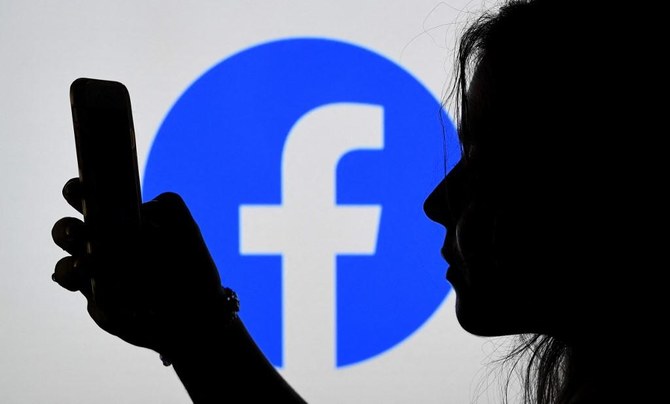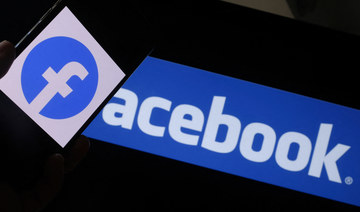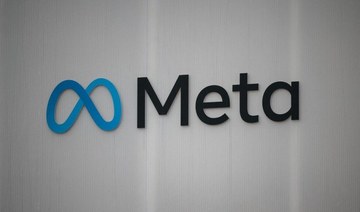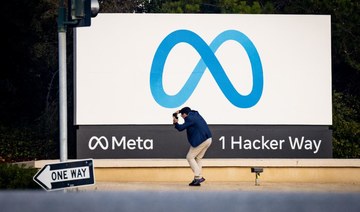WASHINGTON: Facebook is paying a $4.75 million fine and up to $9.5 million to eligible victims to resolve the Justice Department’s allegations that it discriminated against US workers in favor of foreigners with special visas to fill high-paying jobs.
Facebook also agreed in the settlement announced Tuesday to train its employees in anti-discrimination rules and to conduct more widespread advertising and recruitment for job opportunities in its permanent labor certification program, which allows an employer to hire a foreign worker to work permanently.
The department’s civil rights division said the social network giant “routinely refused” to recruit, consider or hire US workers, a group that includes US citizens and nationals, people granted asylum, refugees and lawful permanent residents, for positions it had reserved for temporary visa holders.
Facebook sponsored the visa holders for “green cards” authorizing them to work permanently. The so-called H-1B visas are a staple of Silicon Valley, widely used by software programmers and other employees of major US technology companies.
Critics of the practice contend that the foreign nationals will work for lower wages than US citizens. The tech companies maintain that’s not the case, that they turn to foreign nationals because they have trouble finding qualified programmers and other engineers who are US citizens.
“In principle, Facebook is doing a good thing by applying for green cards for its workers, but it has also learned how to game the system to avoid hiring US tech workers,” said Daniel Costa, director of immigration law and policy research at the liberal-leaning Economic Policy Institute. “Facebook started lobbying to change the system more to its liking starting back in 2013 when the comprehensive immigration bill that passed the Senate was being negotiated.”
The settlement terms announced Tuesday are the largest civil penalty and back-pay award ever recovered by the civil rights division in the 35-year history of enforcing anti-discrimination rules under the Immigration and Nationality Act, officials said. The back pay would be awarded to people deemed to have been unfairly denied employment.
The government said Facebook intentionally created a hiring system in which it denied qualified US workers a fair opportunity to learn about and apply for jobs that it instead sought to channel to temporary visa holders.
“Facebook is not above the law and must comply with our nation’s federal civil rights laws, which prohibit discriminatory recruitment and hiring practices,” Assistant Attorney General Kristen Clarke told reporters in a telephone conference. “Companies cannot set aside certain positions for temporary visa holders because of their citizenship or immigration status.”
Facebook also agreed in a separate settlement with the Labor Department to expand its recruitment for US workers and to be subject to ongoing audits to ensure compliance.
The company based in Menlo Park, California, said it believes it met the government’s standards in its practices. It said it agreed to the settlements to end the litigation and move ahead with its permanent labor certification program — which it called an important part of its “overall immigration program.”
“These resolutions will enable us to continue our focus on hiring the best builders from both the US and around the world, and supporting our internal community of highly skilled visa holders who are seeking permanent residence,” Facebook said in a statement.
Facebook says it ended the April-June quarter this year with over 63,400 full-time employees globally and has 3,000 current job openings.
The lawsuit was filed against Facebook last December by the Justice Department under the Trump administration. The alleged violations are said to have occurred from at least Jan. 1, 2018 to at least Sept. 18, 2019.
A $4.75 million fine and $9.5 million in back pay are a trifle for a company valued at $1 trillion with revenue of nearly $86 billion last year. But the announcement comes at a time of intense public discomfort and scrutiny for Facebook.
Public allegations and testimony to Congress from a former Facebook data scientist that the company disregarded internal research showing harm to children have raised a public outcry and calls for stricter government oversight of the company. The former employee, Frances Haugen, accused Facebook of prioritizing profit over safety and being dishonest in its public fight against hate and misinformation.
The company is also awaiting a federal judge’s ruling in an epic antitrust suit filed against it by the Federal Trade Commission. Calls from critics and lawmakers of both parties to break up the behemoth company are intensifying.
Facebook paying fine to settle US suit on discrimination
https://arab.news/g6n8f
Facebook paying fine to settle US suit on discrimination

- Facebook is paying a hefty fine to resolve allegations that it discriminated against US workers in favor of foreigners with special visas to fill high-paying jobs
- Facebook sponsored the visa holders for “green cards” authorizing them to work permanently.
WhatsApp being used to target Palestinians through Israel’s Lavender AI system

- Targets’ selection based on membership to some WhatsApp groups, new report reveals
- Accusation raises questions about app’s privacy and encryption claims
LONDON: WhatsApp is allegedly being used to target Palestinians through Israel’s contentious artificial intelligence system, Lavender, which has been linked to the deaths of Palestinian civilians in Gaza, recent reports have revealed.
Earlier this month, Israeli-Palestinian publication +972 Magazine and Hebrew-language outlet Local Call published a report by journalist Yuval Abraham, exposing the Israeli army’s use of an AI system capable of identifying targets associated with Hamas or Palestinian Islamic Jihad.
This revelation, corroborated by six Israeli intelligence officers involved in the project, has sparked international outrage, as it suggested Lavender has been used by the military to target and eliminate suspected militants, often resulting in civilian casualties.
In a recent blog post, software engineer and activist Paul Biggar highlighted Lavender’s reliance on WhatsApp.
He pointed out how membership in a WhatsApp group containing a suspected militant can influence Lavender’s identification process, highlighting the pivotal role messaging platforms play in supporting AI targeting systems like Lavender.
“A little-discussed detail in the Lavender AI article is that Israel is killing people based on being in the same WhatsApp group as a suspected militant,” Bigger wrote. “There’s a lot wrong with this.”
He explained that users often find themselves in groups with strangers or acquaintances.
A lot of difficult questions for Meta before that trust can be rebuilt, and I don't honestly believe that Meta can or will answer them pic.twitter.com/vaeLbg9hx3
— Paul Biggar (@paulbiggar) April 16, 2024
Biggar also suggested that WhatsApp’s parent company, Meta, may be complicit, whether knowingly or unknowingly, in these operations.
He accused Meta of potentially violating international humanitarian law and its own commitments to human rights, raising questions about the privacy and encryption claims of WhatsApp’s messaging service.
The revelation is just the latest of Meta’s perceived attempts to silence pro-Palestinian voices.
Since before the beginning of the conflict, the Menlo Park giant has faced accusations of double standards favoring Israel.
In February, the Guardian revealed that Meta was considering the expansion of its hate speech policy to the term “Zionist.”
More recently, Meta quietly introduced a new feature on Instagram that automatically limits users’ exposure to what it deems “political” content, a decision criticized by experts as a means of systematically censoring pro-Palestinian content.
Responding to requests for comment, a WhatsApp spokesperson said that the company could not verify the accuracy of the report but assured that “WhatsApp has no backdoors and does not provide bulk information to any government.”
Eastern European mercenaries suspected of attacking Iranian journalist Pouria Zeraati

- UK security services believe criminal proxies with links to Tehran carried out London knife attack
LONDON: Police said on Friday that a group of Eastern European mercenaries is suspected to have carried out the knife attack on Iranian journalist Pouria Zeraati in late March.
Zeraati was stabbed repeatedly by three men in an attack outside his south London home.
The Iran International presenter lost a significant amount of blood and was hospitalized for several days. He has since returned to work, but is now living in a secure location.
Iran International and its staff have faced repeated threats, believed to be linked to the Iranian regime, which designated the broadcaster as a terrorist organization for its coverage of the 2022 protests.
Iran’s charge d’affaires, Seyed Mehdi Hosseini Matin, denied any government involvement in the attack on Zeraati.
Investigators revealed that the suspects fled the UK immediately after the incident, with reports suggesting they traveled to Heathrow Airport before boarding commercial flights to different destinations.
Police are pursuing leads in Albania as part of their investigation.
Counterterrorism units and Britain’s security services leading the inquiry believe that the attack is another instance of the Iranian regime employing criminal proxies to target its critics on foreign soil.
This method allows Tehran to maintain plausible deniability and avoids raising suspicions when suspects enter the country.
Zeraati was attacked on March 29 as he left his home home to travel to work. His weekly show serves as a source of impartial and uncensored news for many Iranians at home and abroad.
In an interview with BBC Radio 4’s “Today” program this week, Zeraati said that while he is physically “much better,” mental recovery from the assault “will take time.”
Court orders release of prominent Palestinian professor suspected of incitement

- Nadera Shalhoub-Kevorkian was under investigation after questioning Hamas atrocities, criticizing Israel
- Insufficient justification for arrest, says court
- Detention part of a broader campaign, says lawyer
LONDON: The prominent Hebrew University of Jerusalem professor, Nadera Shalhoub-Kevorkian, was released on Friday after a court order rejected police findings.
The criminologist and law professor was arrested the previous day on suspicion of incitement. She had been under investigation for remarks regarding the Oct. 7 attacks by Hamas and for saying Israelis were committing “genocidal crimes” in the Gaza Strip and should fear the consequences.
On Friday, the court dismissed a police request to extend her remand, citing insufficient justification for the arrest, according to Hebrew media reports.
Protesters gathered outside the courthouse to demonstrate against Shalhoub-Kevorkian’s arrest.
Israeli Channel 12, which first reported the news, did not specify where Shalhoub was arrested but her lawyer later confirmed she was apprehended at her home in the Armenian Quarter of Jerusalem.
“She’s not been in good health recently and was arrested in her home,” Alaa Mahajna said. “Police searched the house and seized her computer and cellphone, [Palestinian] poetry books and work-related papers.”
Mahajna described Shalhoub-Kevorkian’s arrest as part of a broader campaign against her, which has included numerous threats to her life and of violence.
The professor was suspended by her university last month after calling for the abolition of Zionism and suggesting that accounts of sexual assault during the Hamas-led attacks on Israel were fabricated.
The suspension was initially criticized by the university community as a blow to academic freedom in Israel. However, the decision was later reversed following an apology from Shalhoub-Kevorkian and an admission that sexual assaults took place.
Since hostilities began last year, numerous dissenting voices in Israel have faced arrest for expressing solidarity with victims of the bombardment in Gaza.
In October, well-known ultra-Orthodox Israeli journalist Israel Frey was forced into hiding following a violent attack on his home.
Bayan Khateeb, a student at the Technion-Israel Institute of Technology, was arrested last year for incitement after posting an Instagram story showing the preparation of a popular spicy egg dish with the caption: “We will soon be eating the victory shakshuka.”
Sony, Apollo discuss joint bid for Paramount, says source

- Paramount is already in an exclusive deal with Skydance Media over possible merger
LONDON: Sony Pictures Entertainment and Apollo Global Management are discussing making a joint bid for Paramount Global, according to a person familiar with the matter.
The companies have yet to approach Paramount, which is in exclusive deal talks with Skydance Media, an independent studio led by David Ellison, though some investors have urged Paramount to explore other options.
The competing bid, which is still being structured, would offer cash for all outstanding Paramount shares and take the company private, the source said.
Sony would hold a majority stake in the joint venture and operate the media company, and its library of films, including such classics as “Star Trek,” “Mission:Impossible” and “Indiana Jones,” and television characters like SpongeBob SquarePants, according to the source.
Sony Pictures Entertainment Chairman Tony Vinciquerra, a veteran media executive with deep experience in film and television, would likely run the studio and take advantage of Sony’s marketing and distribution.
Apollo would likely assume control of the CBS broadcast network and its local television stations, because of restrictions on foreign ownership of broadcast stations, the source said. Sony’s parent corporation is headquartered in Tokyo.
The New York Times first reported the Sony-Apollo discussions. Paramount and Sony declined comment. Apollo could not be reached for comment.
The private equity firm previously made a $26 billion offer to buy Paramount Global, whose enterprise value at the end of 2023 was about $22.5 billion.
A special committee of Paramount’s board elected to continue with its advanced deal talks with Skydance, rather than chase a deal “that might not actually come to fruition,” said two people with knowledge of the board’s action.
The board committee is evaluating the possible acquisition of the smaller independent studio in a stock deal worth $4 billion to $5 billion.
Skydance is negotiating separately to acquire National Amusements, a company that holds the Redstone family’s controlling interest in Paramount, according to a person familiar with the deal terms. That transaction is contingent upon a Skydance-Paramount merger.
Meta releases beefed-up AI models, eyes integration into its apps

- AI model Llama 3 takes step towards human-level intelligence, Meta claims
- Company also announced new AI Assistant integration into its major social media apps
SAN FRANCISCO: Meta on Thursday introduced an improved AI assistant built on new versions of its open-source Llama large language model.
Meta AI is smarter and faster due to advances in the publicly available Llama 3, the tech titan said in a blog post.
“The bottom line is we believe Meta AI is now the most intelligent AI assistant that you can freely use,” Meta co-founder and chief executive Mark Zuckerberg said in a video on Instagram.
Being open source means that developers outside of Meta are free to customize Llama 3 as they wish and the company may then incorporate those improvements and insights in an updated version.
“We’re excited about the potential that generative AI technology can have for people who use Meta products and for the broader ecosystem,” Meta said.
“We also want to make sure we’re developing and releasing this technology in a way that anticipates and works to reduce risk.”
That effort includes incorporating protections in the way Meta designs and releases Llama models and being cautious when it adds generative AI features to Facebook, Instagram, WhatsApp, and Messenger, according to Meta.
“We’re also making Meta AI much easier to use across our apps. We built it into the search box right at the top of WhatsApp, Facebook, and Instagram messenger, so any time you have a question, you can just ask it right there,” said Zuckerberg in the video.
AI models, Meta’s included, have been known to occasionally go off the rails, giving inaccurate or bizarre responses in episodes referred to as “hallucinations.”
Examples shared on social media included Meta AI claiming to have a child in the New York City school system during an online forum conversation.
Meta AI has been consistently updated and improved since its initial release last year, according to the company.
“Meta’s slower approach to building its AI has put the company behind in terms of consumer awareness and usage, but it still has time to catch up,” said Sonata Insights chief analyst Debra Aho Williamson.
“Its social media apps represent a massive user base that it can use to test AI experiences.”
By weaving AI into its family of apps, Meta will quickly get features powered by the technology to billions of people and benefit from seeing what users do with it.
Meta cited the example of refining the way its AI answers prompts regarding political or social issues to summarize relevant points about the topic instead of offering a single point of view.
Llama 3 has been tuned to better discern whether prompts are innocuous or out-of-bounds, according to Meta.
“Large language models tend to overgeneralize, and we don’t intend for it to refuse to answer prompts like ‘How do I kill a computer program?’ even though we don’t want it to respond to prompts like ‘How do I kill my neighbor?’,” Meta explained.
Meta said it lets users know when they are interacting with AI on its platform and puts visible markers on photorealistic images that were in fact generated by AI.
Beginning in May, Meta will start labeling video, audio, and images “Made with AI” when it detects or is told content is generated by the technology.
Llama 3, for now, is based in English but in the coming months Meta will release more capable models able to converse in multiple languages, the company said.



















